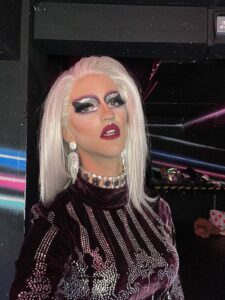Alumni Spotlight: Liam Maddin
We recently sat down with MA Theatre Directing graduate Liam Maddin to talk dealing with rejection, the pressures of ‘traditional success’ and drag.
Why did you decide on the MA Theatre Directing?

Liam Maddin (photo credit: Benkin Photography)
I felt like I needed an exit strategy in January 2020 when I moved back home to Sussex with my mum. I was at the place where I had no skills to offer my town, and my town had nothing to offer me. I had a friend who was taking the MA Creative Producing, and said it’s great, Mountview’s great and that I should consider it.
“A highlight of my time at Mountview would be putting on a show in the height of the pandemic, and I think we all realised what we were doing was insane, but we did it!”
It was a slight risk, I knew I was doing it in the middle of such an uncertain time. I’d also never been to Mountview, so I didn’t even know if I was going to like it. As soon as I got here it felt correct. A highlight of my time at Mountview, would be putting on a show in the height of the pandemic, and I think we all realised what we’re doing is insane, but we did it! The quality of the teaching and the course is always going to be memorable. We had visiting speakers like Rebecca Frecknall and Dawn Walton. It was a real achievement to do the course during a pandemic, and it was a great course.
How did you find it after finishing the course?
I definitely knew that directing full-time was a long-term goal. But after graduating I felt like I was getting nothing. In 2022, I was really going for it, every application – go, go, go! A friend of mine who is an actor told me a great thing about the process of rejection. She rewards herself after every 10 rejections. So, for every 10 rejections I would give myself a little treat. But at a certain point, I had no mental space left. I have to rely on myself financially, and I got to a point where I didn’t see how I could do this and also be happy. That’s when I made the decision to pause it and just do something else. To reassess my priorities. I don’t begrudge theatre or anyone who is making the work and doing the thing – that’s amazing. But I felt like for me if it’s not happening, maybe it’s not the time, and when it is, the door will reopen and I’m very content with that. It would have been nice if it worked for me now but you can’t be angry all the time. I think there should be more celebration of the journeys that past students take, regardless of whether it’s seen as ‘traditional success’.
“I think there should be more celebration of the journeys that past students take, regardless of whether it’s seen as ‘traditional success’.”
It can make those who don’t achieve that [‘traditional success’] feel like they’re failing and that they’re not good enough. I remember something a lecturer said: “the industry will always be there”. If you feel like you want to take a break, that’s okay. So that’s when I poured more energy into drag, and that’s been a bit of a revelation. I’m still using the pieces I learnt during my training and my time at Mountview to inform what I do.
How did you get into drag?
I was working at the Theatre Royal Bath, there was a Christmas party, and the theme was characters from the season we’d had that year. I remember Amanda Abbington as Beverly Moss in Abigail’s Party and I chose that character to go in drag in. And that’s when my drag persona, Beverly Monét, was born. It was something else that again clicked, oh this is fun, this is joyful, there’s an expression here, there’s creativity here. Slowly overtime, I gained more experience, and moving to London, if you want to do drag then here’s the place to do it.

Beverly Monét
I remember a time when I thought if I wasn’t directing then it wasn’t worth it. You have to do what serves you, of course it’s a difficult feeling seeing your peers go ‘further’ and already doing what you want, and you’re not.
“I would encourage every artist to just try a different artform, because what if you figure out ‘that’s it, that’s the one’?”
I felt like I was fortunate to know what I wanted to do. At first I thought I wanted to be an actor, then it was I wanted to be a director, but now I want to do what makes me happy. Now, getting older, what I want to be is not a title, but a feeling. Whatever I do I always give my all because I have that and I have drag – it’s the happiest I feel like I’ve been in ages, especially in this post-Covid world. I still consider myself a director, even though I don’t do it as much but I’m still drawing on the training I received.
If you’re meant for it, and it’s meant for you – you will find it. I have faith in that. With directing it has always been about the story telling, and I think that is why drag has come to the forefront for me. Every time you get up on stage in drag, you’re telling a story. And I’m still doing it, but I’m just doing it in a different artform. I would encourage every artist to just try a different artform, because what if you figure out ‘that’s it, that’s the one’?
